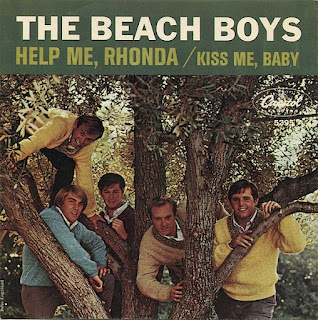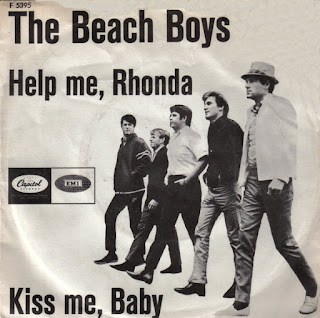BEACH BOYS - HELP ME, RHONDA
Estrena: 5 d'abril de 1965
Llistes: EUA: #1 (2 setmanes) Regne Unit: #27
"Help Me, Rhonda" és una cançó escrita per Brian Wilson amb lletra de Mike Love. Aquesta cançó es distingeix d'altres cançons dels Beach Boys de l'època perquè compta amb la veu principal d'Al Jardine, en lloc de les veus habituals de Brian Wilson o Mike Love com a cantants principals. La cançó es va convertir en un dels grans èxits de la banda a mitjans dels anys 60.
Tant Mike Love com Brian Wilson han explicat que "Help Me, Rhonda" no es basa en cap persona real. Mike Love va mencionar que, tot i que moltes noies anomenades Rhonda potser s’han sentit representades per la cançó, el personatge és completament fictici. Després de llançar-la inicialment a l'àlbum “The Beach Boys Today!”, Wilson va sentir que tenia més potencial i va regravar una nova versió per a l'àlbum “Summer Days (And Summer Nights!!” amb nous arranjaments i una lletra diferent. Aquesta versió es va llançar com a single l'abril de 1965 i va ser un gran èxit, arribant al número 1 del Billboard Hot 100, convertint-se en el segon single dels Beach Boys en encapçalar les llistes després de "I Get Around".
Brian Wilson va explicar que es van gravar dues versions de "Help Me, Rhonda": una amb un ukelele i una altra amb guitarres. Finalment, es va triar la versió amb guitarres per ser llançada. Inicialment, Wilson interpretava la veu principal, però més tard va decidir que Al Jardine s'encarregués de fer-ho. Com a productor de la banda, Wilson tenia una intuïció forta sobre quin membre havia de fer de veu principal en cada cançó, i sovint escrivia cançons específiques pensant en certs membres de la banda.
Mike Love va parlar de la seva col·laboració en la composició de cançons amb Brian Wilson en els primers èxits dels Beach Boys. Love va explicar que el seu procés era sovint espontani, amb un d'ells aportant una idea inicial que després desenvolupaven junts. Per a "Help Me, Rhonda", Wilson ja havia creat una gran pista, i Love va contribuir escrivint unes lletres que s'ajustaven a la melodia. Love va mencionar que, mentre Wilson es concentrava en la música, ell s'inclinava cap als seus punts forts en literatura i poesia per donar forma a la lletra. Després portaven músics com Carl i Dennis per finalitzar la pista.
"Help Me, Rhonda" explica la història d'un home amb el cor trencat, les esperances del qual de casar-se amb una noia s'han esvaït després que ella comenci a sortir amb algú altre. En la seva desesperació, es dirigeix a Rhonda, suplicant-li que l'ajudi a alleujar el seu dolor perquè la troba atractiva. Tot i el tema seriós emocionalment, la cançó es caracteritza per un tempo animat i un to lleuger, creant un contrast interessant entre la lletra i la música.
A "Help Me, Rhonda", la repetició de frases clau emfatitza la desesperació i el turment emocional del protagonista. La frase "get her out of my heart" (treure-la del meu cor) apareix cinc vegades, reflectint la seva lluita contínua per superar el seu amor perdut. La frase del títol, "help me, Rhonda", es repeteix 18 vegades, reforçant la seva petició d'ajuda. En total, "Rhonda" es menciona 45 vegades, mentre que "help" apareix 61 vegades, il·lustrant el tema central de cercar consol.
BEACH BOYS - HELP ME, RHONDA
Released: April 5, 1965
Charts: US: #1 (2 weeks) UK: #27
"Help Me, Rhonda" is a song written by Brian Wilson with lyrics from Mike Love. The song stands out from other Beach Boys tracks of the time due to its lead vocal by Al Jardine, rather than the usual leads by Brian Wilson or Mike Love. The song became one of the band's major hits during the mid-'60s.
According to both Mike Love and Brian Wilson, "Help Me, Rhonda" was not based on a real person. Mike Love mentioned that although many girls named Rhonda may have received comments about the song, the character was purely fictional. After initially releasing the song on “The Beach Boys Today!” album, Wilson felt it had more potential and re-recorded a new version for the “Summer Days (And Summer Nights!!)” album with different arrangements and lyrics. This version was released as a single in April 1965 and became a major hit, reaching No. 1 on the Billboard Hot 100, making it the Beach Boys' second chart-topping single after "I Get Around."
Brian Wilson explained that there were two versions of "Help Me, Rhonda" recorded—one featuring a ukulele and another with guitars. The guitar version was ultimately chosen for release. Initially, Wilson sang the lead but later decided that Al Jardine should take over the lead vocals. As the band's producer, Wilson had a strong intuition about which member should sing lead on various tracks, and he often wrote specific songs with certain band members in mind.
Mike Love discussed his songwriting collaboration with Brian Wilson on The Beach Boys' early hits. Love explained that their process was often spontaneous, with one of them bringing an initial idea that they would develop together. For "Help Me, Rhonda," Wilson had already created a great track, and Love contributed by writing lyrics that fit the melody. Love mentioned that while Wilson focused on the music, he leaned into his strengths in literature and poetry to shape the lyrics. They would then bring in musicians like Carl and Dennis to finalize the track.
"Help Me, Rhonda" tells the story of a heartbroken man whose hopes of marrying a girl have been shattered after she starts dating someone else. In his despair, he turns to Rhonda, pleading for her to help ease his pain because he finds her attractive. Despite the serious emotional themes, the song is characterized by its upbeat tempo and lighthearted feel, creating an interesting contrast between the lyrics and the music.
In "Help Me, Rhonda," the repetition of key phrases emphasizes the protagonist's desperation and emotional turmoil. The phrase "get her out of my heart" appears five times, reflecting his ongoing struggle to move on from his lost love. The title phrase, "help me, Rhonda," is repeated 18 times, reinforcing his plea for assistance. Overall, "Rhonda" is mentioned 45 times, while "help" appears 61 times, illustrating the central theme of seeking solace.










Cap comentari:
Publica un comentari a l'entrada